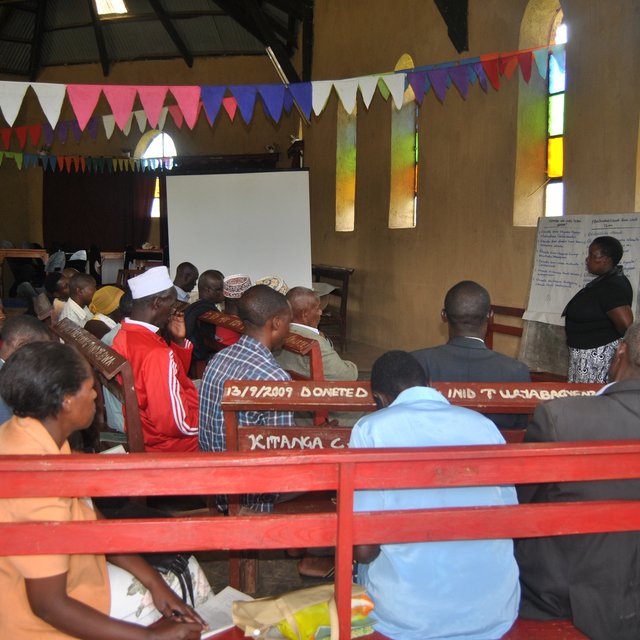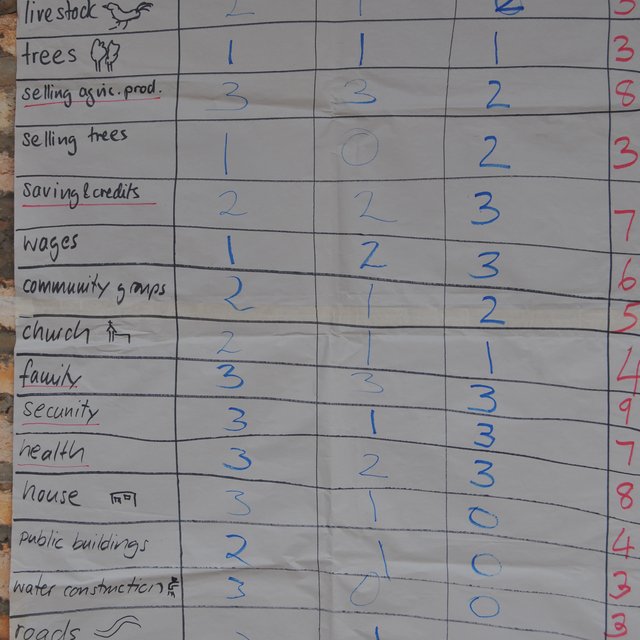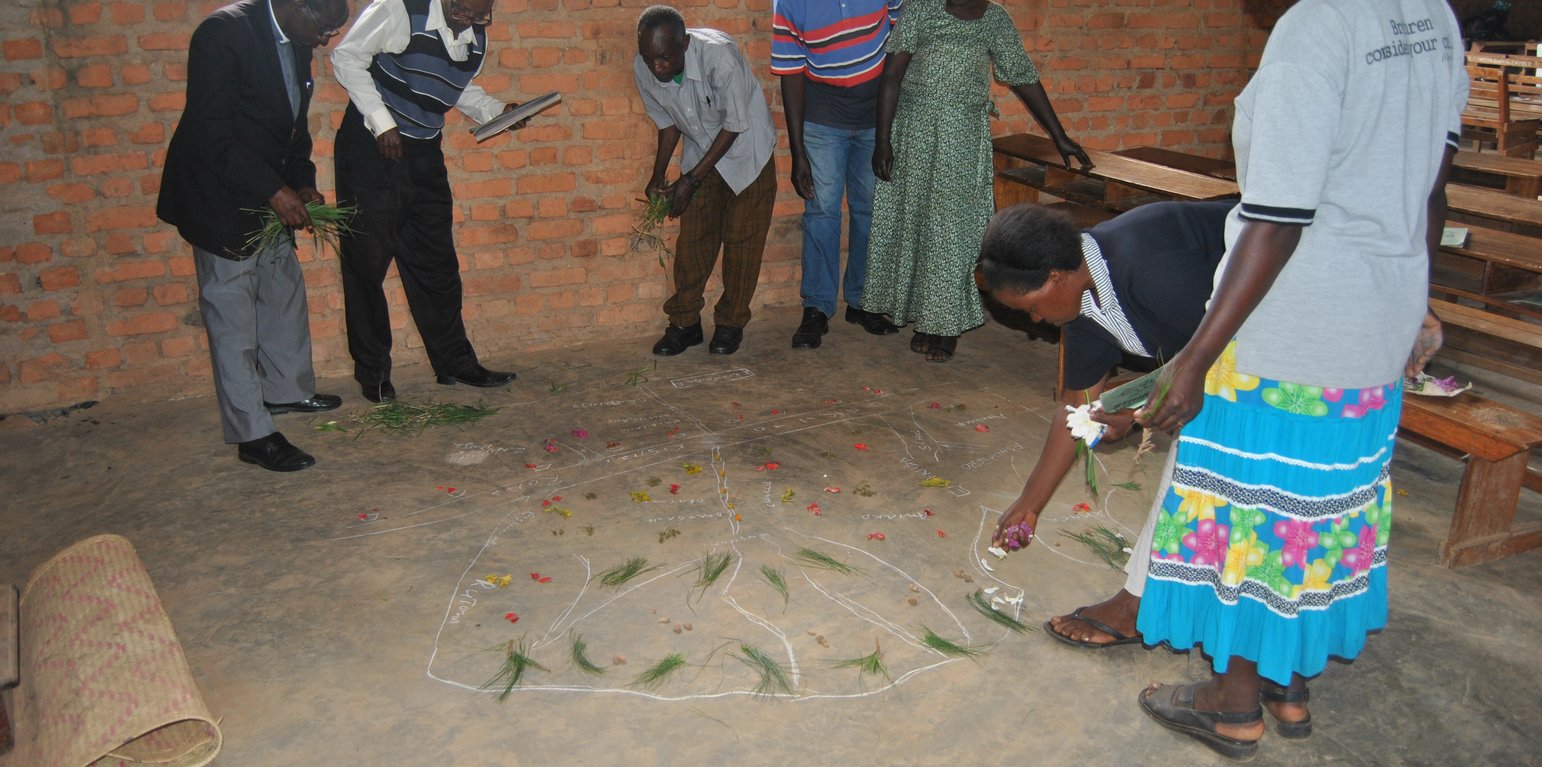Catchment Based Integrated Water Resources Management
(Uganda)
Okurinda ebyobuhangwa
Descripción
Catchment based integrated water resources management is a process which promotes the coordinated development and management of water, land and related resources in order to maximise economic and social welfare in an equitable manner without compromising the sustainability of vital eco systems
This approach brings together all the people who are using the land resources within a defined area
This approach entails community mobilisation, organisation and empowerment to jointly harness and manage their resources sustainably for optimum benefits
The process begins when a request from a community is received. This is followed by an assessment to ascertain the needs and the level of involvement of the community.
The community is then mobilised through the religious and local leaders. The leaders then facilitate formation of local environment committees which are trained
The local environment committees convene community meetings and the community does the hazard and vulnerability assessments, and identifies the adaptation strategies. The community then identifies resource user groups which are trained and supported to implement the technologies
The stakeholders involved were the church and local leaders who do the mobilisation, government technical staff for technical backup and supports enforcement of by-laws, community members who attend meetings and trainings and participate in applying the technologies, Kigezi Diocese Water and Sanitation Programme (KDWSP) which provides technical expertise and subsidises implementation of the technologies, development partners who provide funding and capacity building for implementation staff, other development agencies who share experiences
The land users appreciate the approach because it puts them at the forefront of the planning and implementation to address their problems. However, the approach is demanding in terms of time
Lugar
![]()
Lugar: Rubaya Sub County, Kabale District, South Western Region, Uganda
Georreferencia de sitios seleccionados
Dato de inicio: n.d.
Año de conclusión: n.d.
Tipo de Enfoque
-
tradicional/ local
-
iniciativa local reciente/ innovadora
-
proyecto/ basado en un programa

Community training on vulnerability analysis (Kenneth Twinamasiko)

Vulnerability matrix (Kenneth Twinamasiko)
Metas del Enfoque y entorno facilitador
Propósitos/ objetivos principales del Enfoque
The main aim of the approach is to ensure that the water and related resources provide a source of livelihood to the people while being preserved for use by future generations and reducing resources based conflicts
Condiciones que facilitan la implementación de la/s Tecnología/s aplicadas bajo el Enfoque
-
Normas y valores sociales/ culturales/ religiosos: There are social groups in the communities which all community members highly conform to. Community members also are very religious and therefore the church is a very effective convener
-
Entorno institucional: Government and church structures are well established to the grass root and they are in support of development programmes
-
Colaboración/ coordinación de actores: Collaboration with other development agencies fosters learning and sharing of experiences and knowledge
-
Marco de trabajo legal (tenencia de tierra, derechos de uso de tierra y agua): People own land in a manner that they are free to use it the way they want
-
Políticas: Relevant policies are in place
-
Conocimiento de MST, acceso a apoyo técnico: This approach builds on already existing local knowledge and existence of government technical teams
Condiciones que impiden la implementación de la/s Tecnología/s aplicadas bajo el Enfoque
-
Disponibilidad/ acceso a recursos y servicios financieros : People are poor because they depend on susbsistence farming, and with limited land, there is low productivity and much of what is produced is consumed
-
Entorno institucional: Although good laws exist, the level of enforcement is low
-
Marco de trabajo legal (tenencia de tierra, derechos de uso de tierra y agua): On the contrary, some people may not easily adopt th technology since it is at their will
-
Gobernanza de tierras (toma de decisiones, implementación y aplicación): Although policies are in place, they are not easily enforced
-
Mercados (para comprar insumos, vender productos) y precios: The farmers have low purchasing power due to poor incomes
-
Carga de trabajo, disponibilidad de mano de obra: The youth and men who are the most energetic are not active and spend most their time gambling and drinking and much of the work is being done by women
Participación y roles de las partes interesadas involucradas
Partes interesadas involucradas en el Enfoque y sus roles
| ¿Qué partes interesadas/ entidades implementadoras estuvieron involucradas en el Enfoque? |
Especifique las partes interesadas |
Describa los roles de las partes interesadas |
| usuarios locales de tierras/ comunidades locales |
|
Attending meetings and trainings and participating in applying the technologies. Mostly women aged between 16 and 60 |
| organizaciones comunitarias |
KDWSP and existing community groups like stretcher groups, local savings and credit groups |
Help to convene community members for meetings and trainings and enforcing by-laws |
| especialistas MST/consejeros agrícolas |
|
Training and providing technical knowledge and overseeing and supervision of technologies |
| investigadores |
|
Provide resource materials |
| profesores/ niños en edad escolar/ estudiantes |
|
Teachers disseminate information, school children (age 8 - 15) engage in music, dance and drama with messages relating to SLM |
| ONG |
|
Sharing experiences |
| sector privado |
|
Supplying inputs and provide market for the produce |
| gobierno local |
|
Mobilisation, enforcement of policies and provide technical support |
| gobierno nacional (planificadores, autoridades) |
|
Make policies and guidelines and provide an enabling environment |
| organización internacional |
|
Provide funding and capacity building for implementing agencies |
Involucramiento de los usuarios locales de tierras/ comunidades locales en las distintas fases del Enfoque
ninguno
pasivo
apoyo externo
interactivo
auto-movilización
iniciación/ motivación
When disasters hit the communities, they organised themselves, through their leaders, and approached KDWSP to support them overcome these and similar disasters
planificación
Following the hazard and vulnerability assessments, KDWSP in partnership with the Ministry of Water and Environment, explained to communities the different technologies and their benefits and the community decided on which technologies to adopt
implementación
The SLM specialists guided the land users on how to implement the technologies
monitoreo y evaluación
The SLM specialists, together with community elected representatives carried out the monitoring of the technologies
La toma de decisiones en la selección de Tecnología MST
Las decisiones fueron tomadas por
-
solamente usuarios de tierras (autoiniciativa)
-
principalmente usuarios de tierras con el apoyo de especialistas MST
-
todos los actores relevantes, como parte de un enfoque participativo
-
principalmente por especialistas MST en consulta con usuarios de tierras
-
solo por especialistas MST
-
por políticos/ líderes
La toma de decisiones se basa en
-
la evaluación de conocimiento MST bien documentado (la toma de decisiones se basa en evidencia)
-
hallazgos de investigaciones
-
la experiencia personal y opiniones (no documentadas)
Apoyo técnico, fortalecimiento institucional y gestión del conocimiento
Las siguientes actividades o servicios fueron parte del enfoque
-
Construcción de capacidades / capacitación
-
Servicio de asesoría
-
Fortalecimiento institucional (desarrollo institucional)
-
Monitoreo y evaluación
-
Investigación
Construcción de capacidades/ capacitación
Se proporcionó capacitación a las siguientes partes interesadas
-
usuarios de tierras
-
personal de campo/ consejeros
Forma de capacitación
-
en el contexto de trabajo
-
de agricultor a agricultor
-
áreas de demostración
-
reuniones públicas
-
cursos
Temas avanzados
Water resources management policies, regulations and guidelines, community based catchment planning, principles of IWRM, IWRM implementation approaches, roles and responsibilities, soil and water conservation practices and conservation farming, soil and water conservation practices and conservation farming, setting out and construction of soil and water conservation channels (use of the A-frame), construction of percolation pits, construction of bench terraces
Servicio de asesoría
Se proporcionó servicio de asesoría
-
en los campos de los usuarios de tierras
-
en centros permanentes
There is a National Agricultural Research Organisation located within the District where land users can go for advisory services. There are also agricultural extension workers at sub county level and project staff who regularly follow up the land users
Fortalecimiento institucional
Se fortalecieron/ establecieron instituciones
-
no
-
sí, un poco
-
sí, moderadamente
-
sí, mucho
Describa la institución, los roles y las responsabilidades, miembros, etc.
The formed local environment committees are comprised of community representatives, local council leaders, sub county leadership and church leaders. They are responsible for mobilising communities, planning, implementation and monitoring of the technologies
Tipo de apoyo
-
financiero
-
construcción de capacidades/ entrenamiento
-
equipo
Detalles adicionales
Monitoreo y evaluación
There is routine field follow up made by KDWSP and the local environment
Financiamiento y apoyo material externo
Presupuesto anual en dólares americanos para el componente MST
-
< 2,000
-
2,000-10,000
-
10,000-100,000
-
100,000-1,000,000
-
> 1,000,000
Precise annual budget: 150000.0
Tearfund Switzerland
Los siguientes servicios o incentivos fueron proporcionados a los usuarios de las tierras
-
Apoyo financiero/material proporcionado a los usuarios de tierras
-
Subsidios para insumos específicos
-
Crédito
-
Otros incentivos o instrumentos
Apoyo financiero/material proporcionado a los usuarios de tierras
Tools for construction of the technologies, seedlings, setting up demonstration sites, training
parcialmente financiado
totalmente financiado
mano de obra
Wages to people who construct the demonstration bench terraces. The beneficiary land user provides food for the laborers
equipo: herramientas
For excavation of conservation channels and percolation pits
agrícola: semillas
For establishment of hedge rows
El trabajo de los usuarios de las tierras fue
-
voluntario?
-
comida por trabajo?
-
pagado en efectivo?
-
recompensado con otro tipo de apoyo material?
Análisis de impacto y comentarios de conclusión
Impactos del Enfoque
No
Sí, un poco
Sí, moderadamente
Sí, mucho
¿El Enfoque empoderó a los usuarios locales de tierras, mejoró el involucramiento de las partes interesadas?
Land users can now do the technologies by themselves, conduct meetings, enforce their own by-laws
¿El Enfoque facilitó la toma de decisiones basada en evidencia?
Management structures are now able to meet regularly to make decisions based on observations and lessons learnt during the implementation of the technologies
¿El Enfoque ayudó a los usuarios de tierras a implementar y mantener Tecnologías MST?
Subsidy as part of the approach was a major support in helping to implement the technologies
¿El Enfoque mejoró la coordinación e implementación efectiva en costos de MST?
The established community management structures are linked to sub county technical staff for technical support and other service providers like other agencies
¿El Enfoque movilizó/mejoró el acceso a recursos financieros para implementar MST?
The approach focussed more on adoption of the technologies and did not go to the extent of training land users to mobilise financial resources
¿El Enfoque mejoró el conocimiento y capacidades de los usuarios para implementar MST?
Trained land users are now able to replicate the technologies with little or no external support
¿El Enfoque mejoró el conocimiento y capacidades de otras partes interesadas?
Local government leaders, churches, CSOs and community leaders were equipped with knowledge on SLM and exposed to best practices
¿El Enfoque construyó/ fortaleció instituciones, colaboración entre partes interesadas?
The stakeholders occasionally meet to discuss SLM matters and other issues are discussed in that forum
¿El Enfoque mitigó conflictos?
Land users work together in implementation of SLM technologies which promotes cohesion
¿El Enfoque empoderó a grupos en desventaja social y económica?
The approach did not specifically target disadvantaged groups
¿El Enfoque mejoró la equidad de género y empoderó a las mujeres y niñas?
Women have been targeted and considered to be part of the management committees or host demonstrations
¿El Enfoque alentó a jóvenes/ la siguiente generación de usuarios de tierras a involucrarse con MST?
SLM messages were disseminated through music, dance and drama by school children and youth who are next generation of land users
¿El Enfoque mejoró cuestiones de tenencia de tierra/ derechos de usuarios que obstaculizaron la implementación de la Tecnologías MST?
By-laws formed and guidelines which were provided to the land users have helped in the implementation of the technologies
¿El Enfoque resultó en mejor seguridad alimentaria/ mejoró la nutrición?
The SLM have helped to reduce fertile soil loss due to erosion, increase soil moisture content and reduce destruction of crops by surface runoff hence improved productivity
¿El Enfoque mejoró el acceso a los mercados?
The approach did not focus on this aspect
¿El Enfoque llevó a un acceso mejorado a tierra y saneamiento?
The technologies under this approach protect existing water sources and sanitation facilities from destruction by surface runoff and landslides and replenish sub-surface water sources
¿El Enfoque llevó a un uso más sostenible/ fuentes de energía?
Under this approach other technologies are integrated including energy saving stoves, agro-forestry which aim at sustainable use of the land resources
¿El Enfoque mejoró la capacidad de los usuarios de tierras a adaptarse a los cambios climáticos/ extemos y mitigar desastres relacionados al clima?
The approach has led to increased adoption of the structures that minimise the impact of surface run offs on the farms of land users
¿El Enfoque llevó a oportunidades de empleo, ingresos?
The approach has resulted in providing training for skilled labour. Beneficiaries are able to sell their labour and the technologies introduced create room for increased productivity from the farms of the land users
Motivación principal del usuario de la tierra para implementar MST
-
producción incrementada
-
incremento de la renta(bilidad), proporción mejorada de costo-beneficio
-
reducción de la degradación de la tierra
-
reducción del riesgo de desastres naturales
-
carga de trabajo reducida
-
pagos/ subsidios
-
reglas y reglamentos (multas)/ aplicación
-
prestigio, presión social/ cohesión social
-
afiliación al movimiento/ proyecto/ grupo/ redes
-
conciencia medioambiental
-
costumbres y creencias, moral
-
conocimiento y capacidades mejorados de MST
-
mejoramiento estético
-
mitigación de conflicto
Sostenibilidad de las actividades del Enfoque
¿Pueden los usuarios de tierras sostener lo que se implementó mediante el Enfoque (sin apoyo externo)?
After learning from the demonstration technologies a number of land users have already adopted the technologies without any external support. It is hoped that this practice will continue after realising the benefits
Conclusiones y lecciones aprendidas
Fortalezas: perspectiva del usuario de tierras
-
The approach strengthens the ability of land users coming together and working together
-
Increases land users capacity to put resources, which were thought to be useless, to better use
-
Creates more opportunities (knock-on effect), for example brick making arising from water retained in the dug percolation pits, silt in percolation pits can be used as manure and construction material like sand, goat rearing from planting hedge rows, manure from goat rearing
Fortalezas: punto de vista del compilador o de otra persona recurso clave
-
The approach addresses a wide range of concerns at once for example the social economic and the environmental issues
-
It incorporates social and environmental considerations directly into policy and decision making
-
It directly involves all stakeholders
-
The approach creates a balance between water being used as a resource and at the same time being preserved
Debilidades/ desventajas/ riesgos: perspectiva del usuario de tierrascómo sobreponerse
-
The approach requires a lot of effort in terms of understanding it and implementing it
Continuous sensitization and training
-
Some of the benefits of this approach are long term
Continuous encouragement and exposure to successful areas and incorporating initiatives that realise short term benefits to keep the land users going
Debilidades/ desventajas/ riesgos: punto de vista del compilador o de otra persona recurso clavecómo sobreponerse
-
The approach is complex in the sense that it is multi-sectoral (cuts across agriculture, health, environment, engineering and governance
Creating sharing platforms from the lowest to the highest level which enable continuous learning
-
Requires a lot of effort from diverse stakeholders - policy makers, policy enforcers, facilitators and implementers
Exposure of the stakeholders to successful areas helps them to appreciate the approach and adopt it
Referencias
Revisado por
-
Renate Fleiner
-
Boris Orlowsky
Fecha de la implementación: 15 de noviembre de 2016
Últimas actualización: 14 de febrero de 2017
Descripción completa en la base de datos de WOCAT
La documentación fue facilitada por
Institución
- Tear Fund Switzerland (Tear Fund Switzerland) - Suiza
Proyecto
- Book project: where people and their land are safer - A Compendium of Good Practices in Disaster Risk Reduction (DRR) (where people and their land are safer)
Referencias claves
-
Kigezi Diocese Water and Sanitation Programme, IWRM Annual Report (April 2015 - March 2016): www.kigezi-watsan.ug
Vínculos a la información relevante disponible en línea





